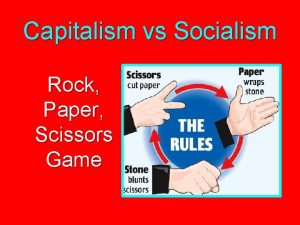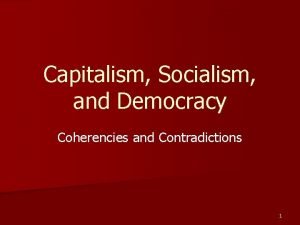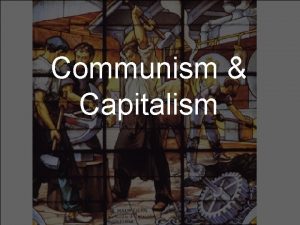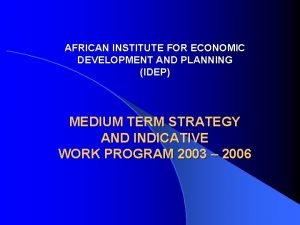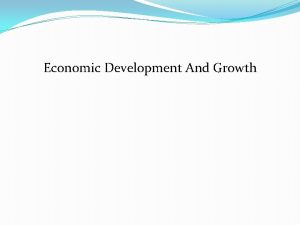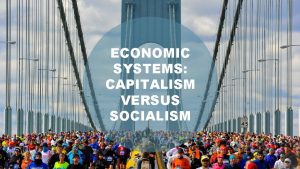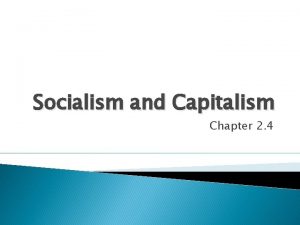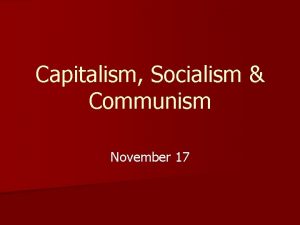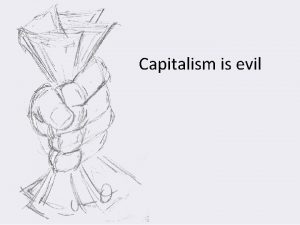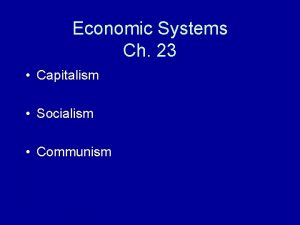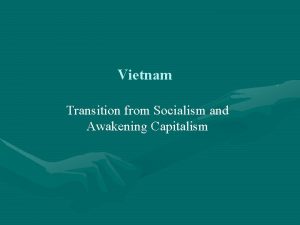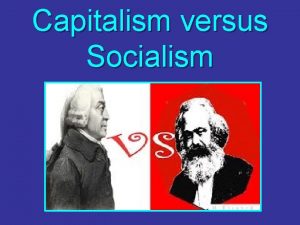Capitalism Socialism or African Socialism Struggles over Economic


















- Slides: 18

Capitalism, Socialism or African Socialism? Struggles over Economic Growth HI 277 Term 1 Week 8 Dr. Natalia Telepneva Office Hours: Mondays, 1 -3 pm

‘Kitchen Debate’, 1959 Nikita Khrushchev and Vice President Richard Nixon debate socialism and capitalism, while looking at US model kitchen on display at the USA Trade and Cultural Fair in Sokolniki Park, Moscow ( July 1959)

Lecture Plan 1. Soviet model of development 2. USA and ‘Modernisation theory’ 3. African Socialism: Ghana, Tanzania 4. New International Economic Order 5. 1970 s: From pragmatism to Neo-Liberalism

Key Argument Struggles over the Economic Growth were crucial for Cold War in Africa The perceived failure of socialistinspired projects in Africa and elsewhere undermined the socialist project in the USSR and vice versa: the collapse of state socialism in USSR and Eastern Europe undermined those in Africa

1. Soviet model of development Recipe for development: • A centrally-devised plan for modernisation, with an emphasis on industry and large infrastructural projects; • nationalisation of key enterprises; • and collectivization of agriculture New concepts: ‘non-capitalist development’ and ‘national democracy’. Jump stages

1. Egypt: Aswan Dam, 19601970 Left: Nasser and Khrushchev inspecting the site for the construction of the Aswan Dam, 1964 Right: The construction of the Aswan dam with Soviet technicians

2. USA and ‘Modernization Theory’ • Walt Rostow, The Stages of Economic Growth: A Non. Communist Manifesto (1960): • All societies developed along the same trajectory • ‘take-off’ required investment in infrastructure and ‘export industries’

2. Rostow and John F. Kennedy JFK launches ‘decade of development’ at the UN General Assembly on 25 September 1961, watch at https: //www. americanrhetoric. com/speeche s/jfkunitednations. htm • Kennedy’s policy in Africa • Modernization theory as bulwark against Soviet communism • Measures: Agency for International Development; Peace Corps

How different were Soviet and American models?

3. African Socialism: Reasons • Concerns with ‘neo-colonialism’ • ‘indigenous way of development’ • Inspired by Soviet planning • need to adapt socialism to African context. African socialism= strategy of ‘indigenous development’

3. Examples: Ghana Location and aerial view of Akosombo dam on the Volta Riveron • Arthur Lewis’s plan • 1958: Trip to the USA. Support for the Volta River Project • 1961: Nkrumah moves to the left. Authoritarian Rule • February 1966: Nkrumah toppled

3. Examples: Tanzania Women working in a communal village in Tanzania • 1961 -3: Modernization Theory and World Bank • Nyerere’s dissatisfied with pace of change • 1967: Arusha declaration. Mass resettlement into ujamaa villages

3. Babu vs. Nyerere with Babu at OAU meeting in 1970 Babu’s proposals: • Establish large state farms; • invest in irrigation and flood control to increase food production; • opposed nationalization of trade Book: African socialism or socialist Africa? (1981)

4. New International Economic Order (NIEO) and its Discontents Raul Prebisch and ‘Dependency theory’ 1964: UN Conference on Trade and Development 1974: UN General Assembly adopts NIEO and demands: • greater aid for developing states; • preferential trade concessions; • right to nationalise natural resources; • regulation of multinational corporations Nyerere on NIEO: “trade union of the poor” Outcomes: little support from the West, growing debt

Was NIEO a failure?

5. From pragmatism to a Neo. Liberal Turn: USSR Soviet disillusionment: • Pace of transformation; ‘ungrateful leaders’ • Congo Crisis: ‘peaceful competition’ was not possible Emphasis on ‘mutual economic advantage’ Yet, interventionism in the 1970 s. Aid to Ethiopia 1980 s: Domestic changes: Gorbachev’s ‘reform and opening’. Shift in priorities. Economic crisis

5. From pragmatism to a Neo. Liberal Turn: USA • 1970 s: technocratic solutions: ‘miracle rice’ and population control • Pursued in Vietnam, India, Pakistan-limited results in reducing poverty • 1980 s: crisis of Keynesian economics and ‘neoliberal arguments’ embrace the markets • Debt crisis Structural adjustment (Washington Consensus). In many countries, this led to human misery, as govts clamped down on welfare spending

Concluding Thoughts Why did socialism in Africa fail? • ‘there was never one project’ • ‘socialism from above’ & lack of socialized democracy (Vijay Prashad) • Structure of the global economy. Oscar Sanches-Sibony: The Soviets never meant to replace the West. • Failure of Socialist Projects Soviet Collapse
 Cross cutting cleavages
Cross cutting cleavages Rock paper scissors capitalism game
Rock paper scissors capitalism game Communism
Communism Socialism and capitalism in an inspector calls bbc bitesize
Socialism and capitalism in an inspector calls bbc bitesize Socialism vs communism
Socialism vs communism Feudalism vs capitalism
Feudalism vs capitalism Capitalism communism socialism fascism
Capitalism communism socialism fascism Communism vs feudalism
Communism vs feudalism Capitalism economic system
Capitalism economic system Benefits of productive struggle
Benefits of productive struggle The struggle between opposing forces
The struggle between opposing forces Productive struggle definition
Productive struggle definition Chapter 14 section 3 hoover struggles with the depression
Chapter 14 section 3 hoover struggles with the depression African institute for economic development and planning
African institute for economic development and planning Economic growth vs economic development
Economic growth vs economic development Lesson 2 our economic choices
Lesson 2 our economic choices Economic development vs economic growth
Economic development vs economic growth Handing over and taking over the watch
Handing over and taking over the watch Over the mountains over the plains
Over the mountains over the plains

